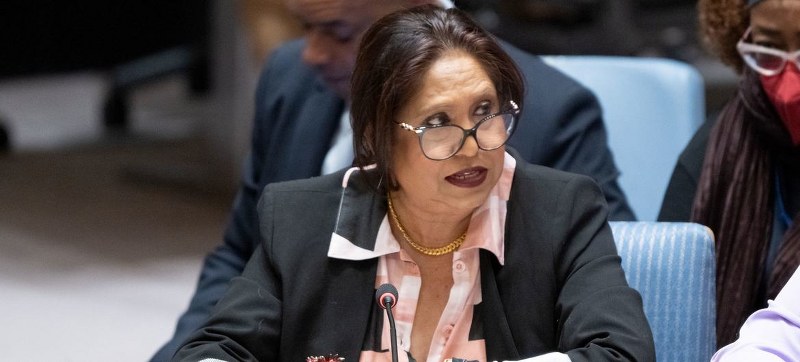 Women Rape
Women Rape Silence the guns, amplify women’s voices for peace to end rape in wartime
The UN verified 3,688 cases of rape and other sexual violence committed in war in 2023, a “dramatic increase” of 50 per cent over the previous year, the Security Council heard on Tuesday.
Presenting her annual report, Pramila Patten, the Secretary-General’s Special Representative on Sexual Violence in Conflict, noted that weapons continue to flow into the hands of perpetrators while most victims remain emptyhanded when it comes to reparations and redress.
“The essential, existential task we face is to silence the guns and amplify the voices of women as a critical constituency for peace,” she said.
An underreported crime
The report covers incidents, patterns and trends across 21 situations of concern, including Israel and Gaza, Sudan, Ukraine, Haiti, Myanmar and the Democratic Republic of the Congo (DRC).
She said the rise in recorded cases was particularly alarming in a global context where humanitarian access remains severely restricted and constrained.
Most cases, 95 per cent, involved women and girls. In 32 per cent of the incidents, children, overwhelmingly girls, were victims, while 21 cases were found to target lesbian, gay, bisexual, transgender, queer and intersex persons.
While the report conveys the severity and brutality of these incidents, she stressed that it does not reflect the global scale or prevalence of what is a chronically underreported, historically hidden crime.
“We know that for every survivor who comes forward, many others are silenced by social pressures, stigma, insecurity, the paucity of services and the limited prospects for justice,” she said.
Gaza conflict
For the first time, the report contains a dedicated section on Israel and the Occupied Palestinian Territory.
In the wake of the 7 October Hamas-led attacks on Israel, the Government invited Ms. Patten to visit the country. She and her team confirmed that there are reasonable grounds to believe that conflict-related sexual violence occurred in at least three locations and that sexual violence was committed against individuals held as hostages, which may be ongoing.
They also visited the occupied West Bank where, according to UN-verified information, the arrests and detention of Palestinian women and men by Israeli security forces following the October attacks have often been accompanied by ill-treatment, including forms of sexual violence. Similar allegations have emerged from Gaza, she added.
“These findings in no way justify or legitimise further hostilities, and I continue to echo the calls of the Secretary-General for a humanitarian ceasefire to end the unspeakable suffering of Palestinian civilians and to bring about the immediate and unconditional release of all hostages,” she said.
Access and impunity
The report documents how sexual violence has curtailed women’s access to livelihoods and girls’ access to education amid record levels of displacement.
“For instance, in eastern DRC, the climate of interlinked physical and food insecurity has driven many displaced women and girls into prostitution out of sheer economic desperation,” she said.
Meanwhile, “sexual violence perpetrated with impunity remains profitable in the political economy of war,” she noted. For example, armed groups in Haiti continue to generate revenue and use the threat of sexual violence to extort even higher ransoms.
Survivors silenced
The report lists 58 parties that are credibly suspected of committing or being responsible for sexual violence, mainly non-State actors. Over 70 per cent are “persistent perpetrators”, meaning they have appeared on the list for five or more years.
Another trend has been the “unprecedented level of lethal violence” to silence survivors of sexual assault, including reports from the DRC and Myanmar of rapists subsequently killing their victims. Armed actors have also threatened healthcare workers in Sudan, while human rights defenders in South Sudan, DRC and elsewhere have faced reprisals.
“Across time and space, we see that the availability of weapons directly facilitates these attacks,” Ms. Patten said.
Hope on the horizon
Stressing that “we cannot address sexual violence without shifting power dynamics,” she called for greater women’s participation, weapons regulation and embargoes, financial support for human rights defenders and change on the ground.
“Women in the war-torn corners of our world need to see hope on the political horizon,” she said.
“Our words, deeds and decisions in this Chamber and beyond must give them cause for hope and must contribute to peace with justice, peace with gender equality, peace with dignity and development, peace that endures.”
Support Our Journalism
We cannot do without you.. your contribution supports unbiased journalism
IBNS is not driven by any ism- not wokeism, not racism, not skewed secularism, not hyper right-wing or left liberal ideals, nor by any hardline religious beliefs or hyper nationalism. We want to serve you good old objective news, as they are. We do not judge or preach. We let people decide for themselves. We only try to present factual and well-sourced news.







